ACU HLSC111 Semester 2 Assignment: Mental Health Promotion Strategies
VerifiedAdded on 2022/11/01
|9
|2319
|135
Report
AI Summary
This report analyzes mental health promotion strategies, focusing on a case study of a 58-year-old chef named Harry who is overweight and recovering from hip replacement surgery. The assignment explores the application of the transtheoretical model of change to categorize Harry's health behavior and uses motivational interviewing techniques to motivate him to improve his health. The report highlights the nurse's role in facilitating behavior change through open-ended questioning, building a therapeutic relationship, and tailoring interventions based on Harry's stage of change. It discusses the strengths and limitations of both the transtheoretical model and motivational interviewing, concluding that these techniques are effective in guiding individuals toward positive lifestyle modifications. The report references relevant literature, including studies on motivational interviewing and the transtheoretical model's application in healthcare settings.
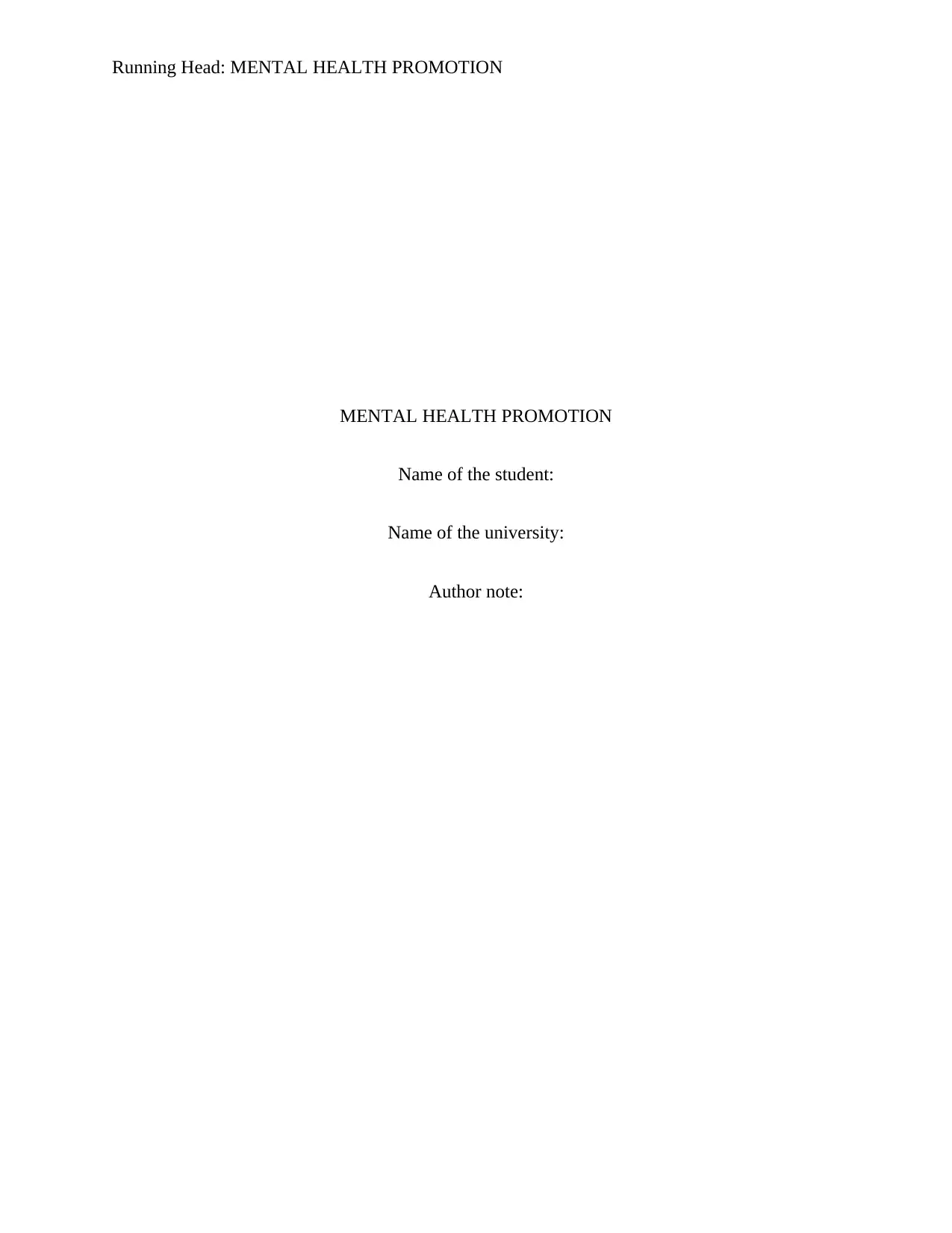
Running Head: MENTAL HEALTH PROMOTION
MENTAL HEALTH PROMOTION
Name of the student:
Name of the university:
Author note:
MENTAL HEALTH PROMOTION
Name of the student:
Name of the university:
Author note:
Paraphrase This Document
Need a fresh take? Get an instant paraphrase of this document with our AI Paraphraser
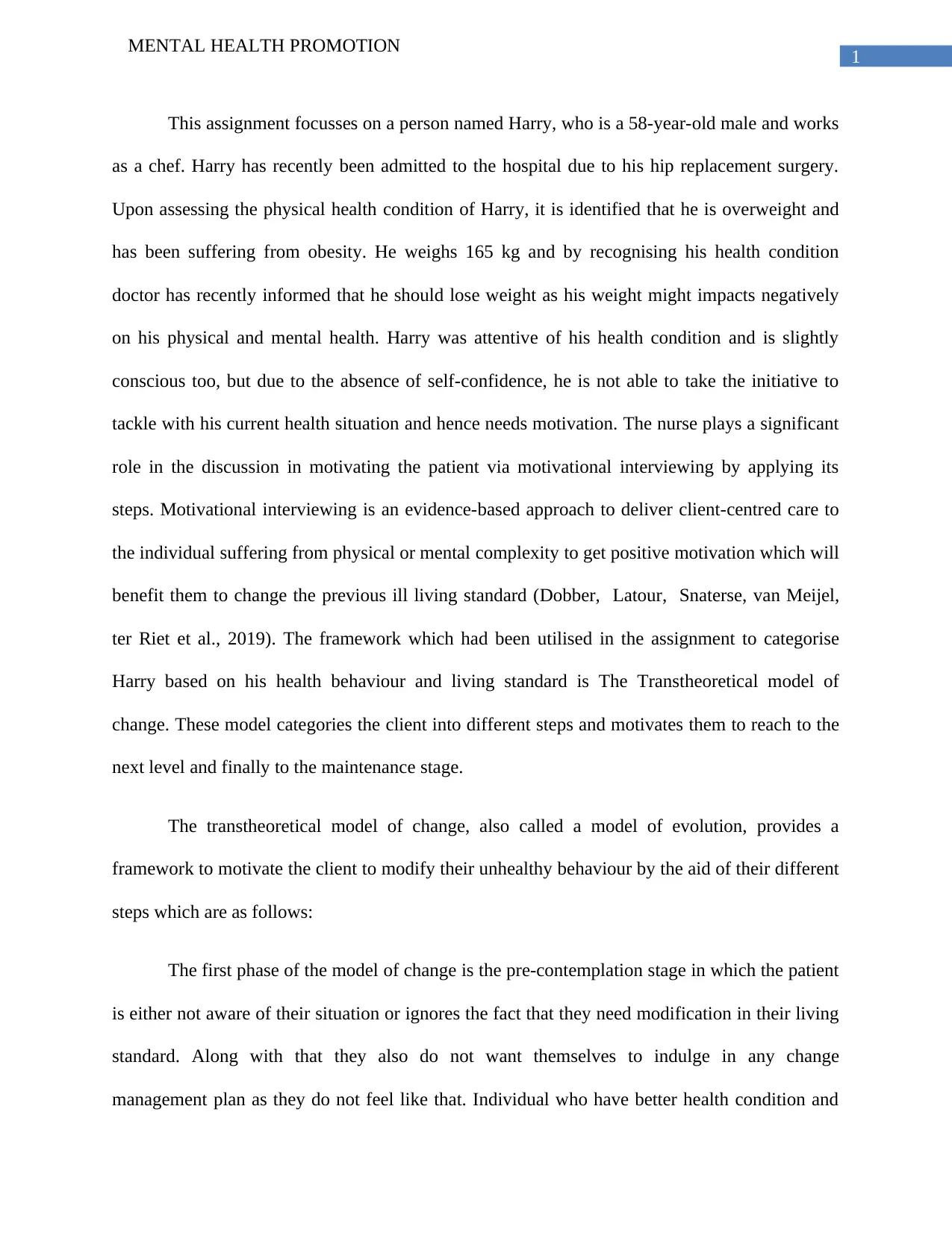
1
MENTAL HEALTH PROMOTION
This assignment focusses on a person named Harry, who is a 58-year-old male and works
as a chef. Harry has recently been admitted to the hospital due to his hip replacement surgery.
Upon assessing the physical health condition of Harry, it is identified that he is overweight and
has been suffering from obesity. He weighs 165 kg and by recognising his health condition
doctor has recently informed that he should lose weight as his weight might impacts negatively
on his physical and mental health. Harry was attentive of his health condition and is slightly
conscious too, but due to the absence of self-confidence, he is not able to take the initiative to
tackle with his current health situation and hence needs motivation. The nurse plays a significant
role in the discussion in motivating the patient via motivational interviewing by applying its
steps. Motivational interviewing is an evidence-based approach to deliver client-centred care to
the individual suffering from physical or mental complexity to get positive motivation which will
benefit them to change the previous ill living standard (Dobber, Latour, Snaterse, van Meijel,
ter Riet et al., 2019). The framework which had been utilised in the assignment to categorise
Harry based on his health behaviour and living standard is The Transtheoretical model of
change. These model categories the client into different steps and motivates them to reach to the
next level and finally to the maintenance stage.
The transtheoretical model of change, also called a model of evolution, provides a
framework to motivate the client to modify their unhealthy behaviour by the aid of their different
steps which are as follows:
The first phase of the model of change is the pre-contemplation stage in which the patient
is either not aware of their situation or ignores the fact that they need modification in their living
standard. Along with that they also do not want themselves to indulge in any change
management plan as they do not feel like that. Individual who have better health condition and
MENTAL HEALTH PROMOTION
This assignment focusses on a person named Harry, who is a 58-year-old male and works
as a chef. Harry has recently been admitted to the hospital due to his hip replacement surgery.
Upon assessing the physical health condition of Harry, it is identified that he is overweight and
has been suffering from obesity. He weighs 165 kg and by recognising his health condition
doctor has recently informed that he should lose weight as his weight might impacts negatively
on his physical and mental health. Harry was attentive of his health condition and is slightly
conscious too, but due to the absence of self-confidence, he is not able to take the initiative to
tackle with his current health situation and hence needs motivation. The nurse plays a significant
role in the discussion in motivating the patient via motivational interviewing by applying its
steps. Motivational interviewing is an evidence-based approach to deliver client-centred care to
the individual suffering from physical or mental complexity to get positive motivation which will
benefit them to change the previous ill living standard (Dobber, Latour, Snaterse, van Meijel,
ter Riet et al., 2019). The framework which had been utilised in the assignment to categorise
Harry based on his health behaviour and living standard is The Transtheoretical model of
change. These model categories the client into different steps and motivates them to reach to the
next level and finally to the maintenance stage.
The transtheoretical model of change, also called a model of evolution, provides a
framework to motivate the client to modify their unhealthy behaviour by the aid of their different
steps which are as follows:
The first phase of the model of change is the pre-contemplation stage in which the patient
is either not aware of their situation or ignores the fact that they need modification in their living
standard. Along with that they also do not want themselves to indulge in any change
management plan as they do not feel like that. Individual who have better health condition and
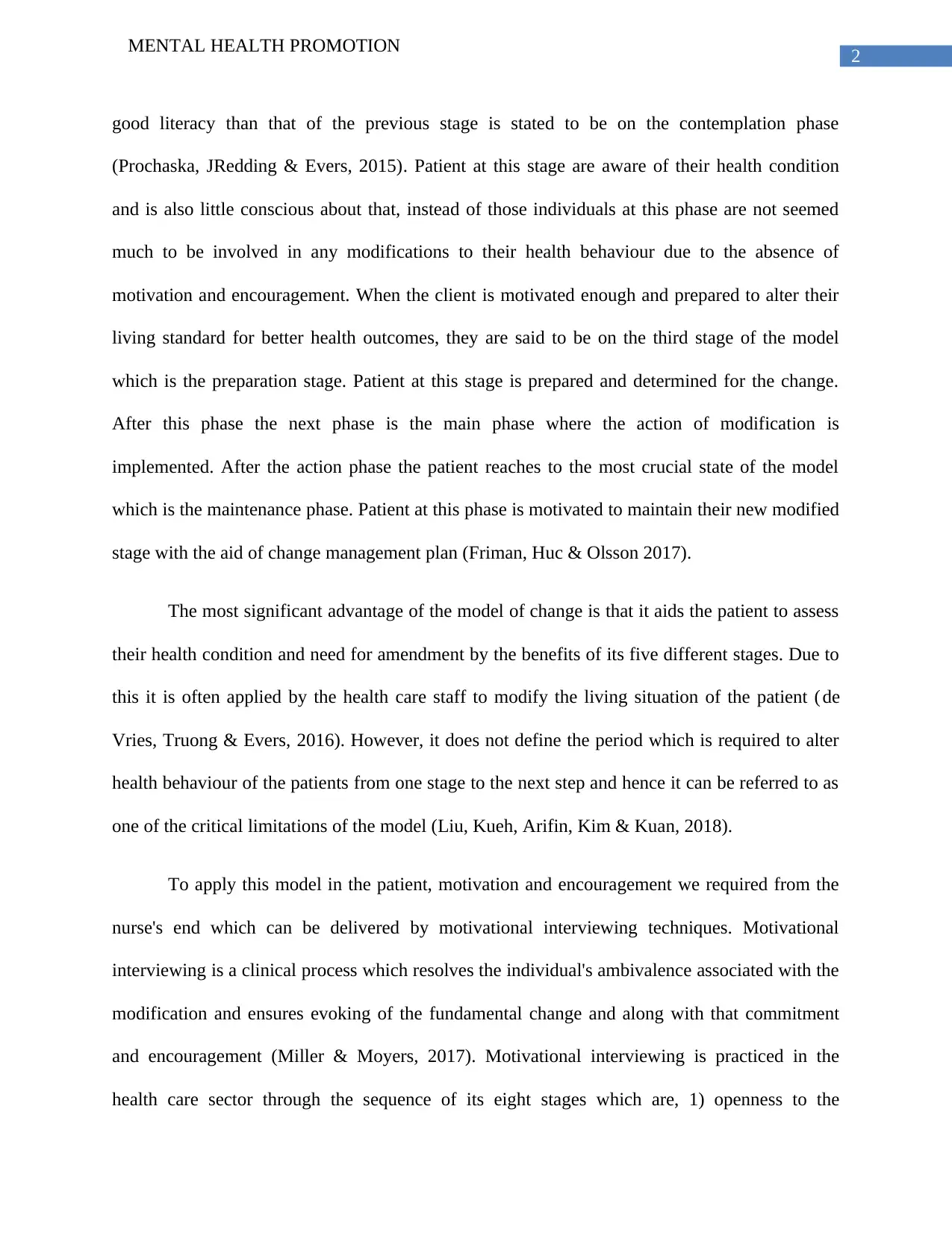
2
MENTAL HEALTH PROMOTION
good literacy than that of the previous stage is stated to be on the contemplation phase
(Prochaska, JRedding & Evers, 2015). Patient at this stage are aware of their health condition
and is also little conscious about that, instead of those individuals at this phase are not seemed
much to be involved in any modifications to their health behaviour due to the absence of
motivation and encouragement. When the client is motivated enough and prepared to alter their
living standard for better health outcomes, they are said to be on the third stage of the model
which is the preparation stage. Patient at this stage is prepared and determined for the change.
After this phase the next phase is the main phase where the action of modification is
implemented. After the action phase the patient reaches to the most crucial state of the model
which is the maintenance phase. Patient at this phase is motivated to maintain their new modified
stage with the aid of change management plan (Friman, Huc & Olsson 2017).
The most significant advantage of the model of change is that it aids the patient to assess
their health condition and need for amendment by the benefits of its five different stages. Due to
this it is often applied by the health care staff to modify the living situation of the patient ( de
Vries, Truong & Evers, 2016). However, it does not define the period which is required to alter
health behaviour of the patients from one stage to the next step and hence it can be referred to as
one of the critical limitations of the model (Liu, Kueh, Arifin, Kim & Kuan, 2018).
To apply this model in the patient, motivation and encouragement we required from the
nurse's end which can be delivered by motivational interviewing techniques. Motivational
interviewing is a clinical process which resolves the individual's ambivalence associated with the
modification and ensures evoking of the fundamental change and along with that commitment
and encouragement (Miller & Moyers, 2017). Motivational interviewing is practiced in the
health care sector through the sequence of its eight stages which are, 1) openness to the
MENTAL HEALTH PROMOTION
good literacy than that of the previous stage is stated to be on the contemplation phase
(Prochaska, JRedding & Evers, 2015). Patient at this stage are aware of their health condition
and is also little conscious about that, instead of those individuals at this phase are not seemed
much to be involved in any modifications to their health behaviour due to the absence of
motivation and encouragement. When the client is motivated enough and prepared to alter their
living standard for better health outcomes, they are said to be on the third stage of the model
which is the preparation stage. Patient at this stage is prepared and determined for the change.
After this phase the next phase is the main phase where the action of modification is
implemented. After the action phase the patient reaches to the most crucial state of the model
which is the maintenance phase. Patient at this phase is motivated to maintain their new modified
stage with the aid of change management plan (Friman, Huc & Olsson 2017).
The most significant advantage of the model of change is that it aids the patient to assess
their health condition and need for amendment by the benefits of its five different stages. Due to
this it is often applied by the health care staff to modify the living situation of the patient ( de
Vries, Truong & Evers, 2016). However, it does not define the period which is required to alter
health behaviour of the patients from one stage to the next step and hence it can be referred to as
one of the critical limitations of the model (Liu, Kueh, Arifin, Kim & Kuan, 2018).
To apply this model in the patient, motivation and encouragement we required from the
nurse's end which can be delivered by motivational interviewing techniques. Motivational
interviewing is a clinical process which resolves the individual's ambivalence associated with the
modification and ensures evoking of the fundamental change and along with that commitment
and encouragement (Miller & Moyers, 2017). Motivational interviewing is practiced in the
health care sector through the sequence of its eight stages which are, 1) openness to the
⊘ This is a preview!⊘
Do you want full access?
Subscribe today to unlock all pages.

Trusted by 1+ million students worldwide
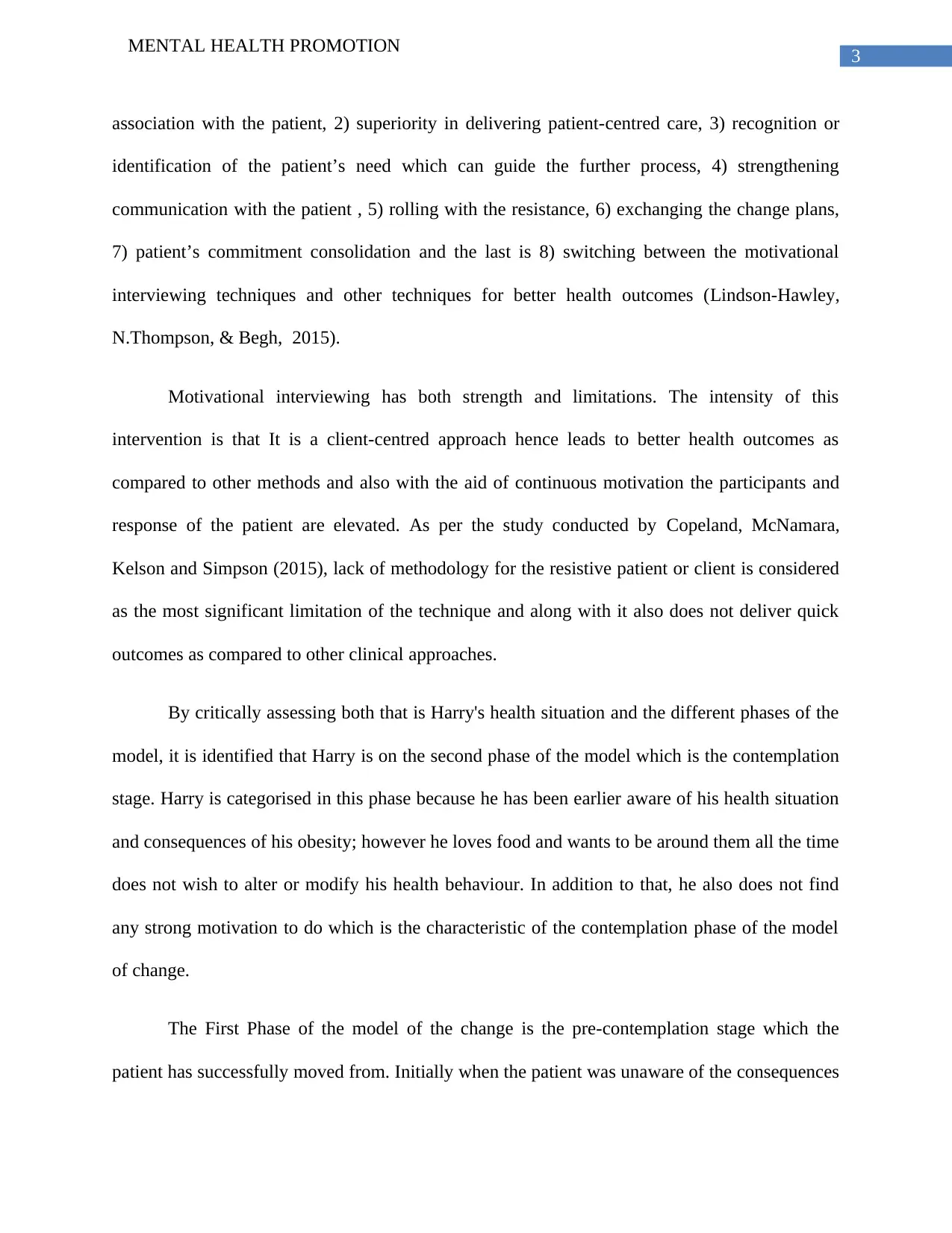
3
MENTAL HEALTH PROMOTION
association with the patient, 2) superiority in delivering patient-centred care, 3) recognition or
identification of the patient’s need which can guide the further process, 4) strengthening
communication with the patient , 5) rolling with the resistance, 6) exchanging the change plans,
7) patient’s commitment consolidation and the last is 8) switching between the motivational
interviewing techniques and other techniques for better health outcomes (Lindson-Hawley,
N.Thompson, & Begh, 2015).
Motivational interviewing has both strength and limitations. The intensity of this
intervention is that It is a client-centred approach hence leads to better health outcomes as
compared to other methods and also with the aid of continuous motivation the participants and
response of the patient are elevated. As per the study conducted by Copeland, McNamara,
Kelson and Simpson (2015), lack of methodology for the resistive patient or client is considered
as the most significant limitation of the technique and along with it also does not deliver quick
outcomes as compared to other clinical approaches.
By critically assessing both that is Harry's health situation and the different phases of the
model, it is identified that Harry is on the second phase of the model which is the contemplation
stage. Harry is categorised in this phase because he has been earlier aware of his health situation
and consequences of his obesity; however he loves food and wants to be around them all the time
does not wish to alter or modify his health behaviour. In addition to that, he also does not find
any strong motivation to do which is the characteristic of the contemplation phase of the model
of change.
The First Phase of the model of the change is the pre-contemplation stage which the
patient has successfully moved from. Initially when the patient was unaware of the consequences
MENTAL HEALTH PROMOTION
association with the patient, 2) superiority in delivering patient-centred care, 3) recognition or
identification of the patient’s need which can guide the further process, 4) strengthening
communication with the patient , 5) rolling with the resistance, 6) exchanging the change plans,
7) patient’s commitment consolidation and the last is 8) switching between the motivational
interviewing techniques and other techniques for better health outcomes (Lindson-Hawley,
N.Thompson, & Begh, 2015).
Motivational interviewing has both strength and limitations. The intensity of this
intervention is that It is a client-centred approach hence leads to better health outcomes as
compared to other methods and also with the aid of continuous motivation the participants and
response of the patient are elevated. As per the study conducted by Copeland, McNamara,
Kelson and Simpson (2015), lack of methodology for the resistive patient or client is considered
as the most significant limitation of the technique and along with it also does not deliver quick
outcomes as compared to other clinical approaches.
By critically assessing both that is Harry's health situation and the different phases of the
model, it is identified that Harry is on the second phase of the model which is the contemplation
stage. Harry is categorised in this phase because he has been earlier aware of his health situation
and consequences of his obesity; however he loves food and wants to be around them all the time
does not wish to alter or modify his health behaviour. In addition to that, he also does not find
any strong motivation to do which is the characteristic of the contemplation phase of the model
of change.
The First Phase of the model of the change is the pre-contemplation stage which the
patient has successfully moved from. Initially when the patient was unaware of the consequences
Paraphrase This Document
Need a fresh take? Get an instant paraphrase of this document with our AI Paraphraser
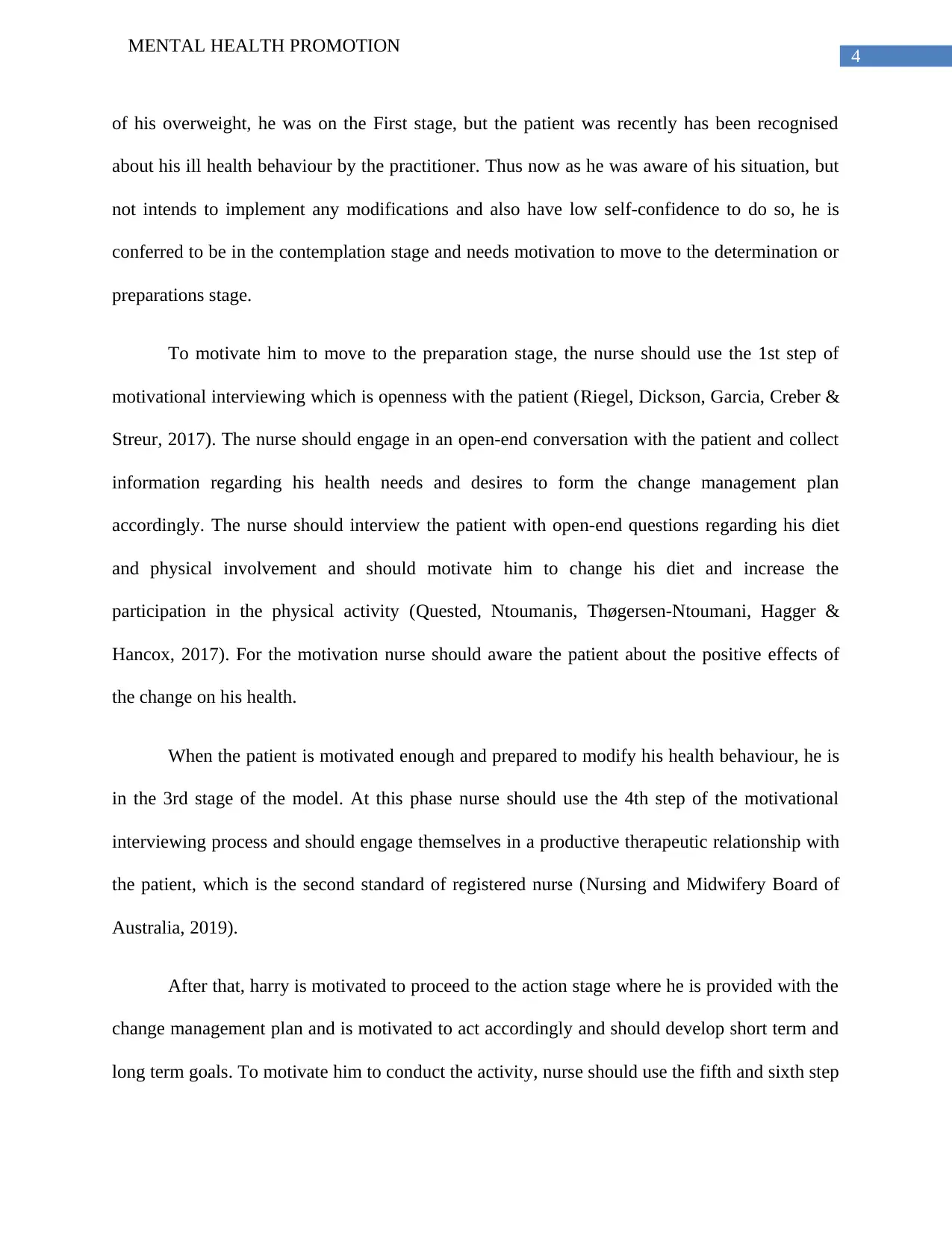
4
MENTAL HEALTH PROMOTION
of his overweight, he was on the First stage, but the patient was recently has been recognised
about his ill health behaviour by the practitioner. Thus now as he was aware of his situation, but
not intends to implement any modifications and also have low self-confidence to do so, he is
conferred to be in the contemplation stage and needs motivation to move to the determination or
preparations stage.
To motivate him to move to the preparation stage, the nurse should use the 1st step of
motivational interviewing which is openness with the patient (Riegel, Dickson, Garcia, Creber &
Streur, 2017). The nurse should engage in an open-end conversation with the patient and collect
information regarding his health needs and desires to form the change management plan
accordingly. The nurse should interview the patient with open-end questions regarding his diet
and physical involvement and should motivate him to change his diet and increase the
participation in the physical activity (Quested, Ntoumanis, Thøgersen-Ntoumani, Hagger &
Hancox, 2017). For the motivation nurse should aware the patient about the positive effects of
the change on his health.
When the patient is motivated enough and prepared to modify his health behaviour, he is
in the 3rd stage of the model. At this phase nurse should use the 4th step of the motivational
interviewing process and should engage themselves in a productive therapeutic relationship with
the patient, which is the second standard of registered nurse (Nursing and Midwifery Board of
Australia, 2019).
After that, harry is motivated to proceed to the action stage where he is provided with the
change management plan and is motivated to act accordingly and should develop short term and
long term goals. To motivate him to conduct the activity, nurse should use the fifth and sixth step
MENTAL HEALTH PROMOTION
of his overweight, he was on the First stage, but the patient was recently has been recognised
about his ill health behaviour by the practitioner. Thus now as he was aware of his situation, but
not intends to implement any modifications and also have low self-confidence to do so, he is
conferred to be in the contemplation stage and needs motivation to move to the determination or
preparations stage.
To motivate him to move to the preparation stage, the nurse should use the 1st step of
motivational interviewing which is openness with the patient (Riegel, Dickson, Garcia, Creber &
Streur, 2017). The nurse should engage in an open-end conversation with the patient and collect
information regarding his health needs and desires to form the change management plan
accordingly. The nurse should interview the patient with open-end questions regarding his diet
and physical involvement and should motivate him to change his diet and increase the
participation in the physical activity (Quested, Ntoumanis, Thøgersen-Ntoumani, Hagger &
Hancox, 2017). For the motivation nurse should aware the patient about the positive effects of
the change on his health.
When the patient is motivated enough and prepared to modify his health behaviour, he is
in the 3rd stage of the model. At this phase nurse should use the 4th step of the motivational
interviewing process and should engage themselves in a productive therapeutic relationship with
the patient, which is the second standard of registered nurse (Nursing and Midwifery Board of
Australia, 2019).
After that, harry is motivated to proceed to the action stage where he is provided with the
change management plan and is motivated to act accordingly and should develop short term and
long term goals. To motivate him to conduct the activity, nurse should use the fifth and sixth step
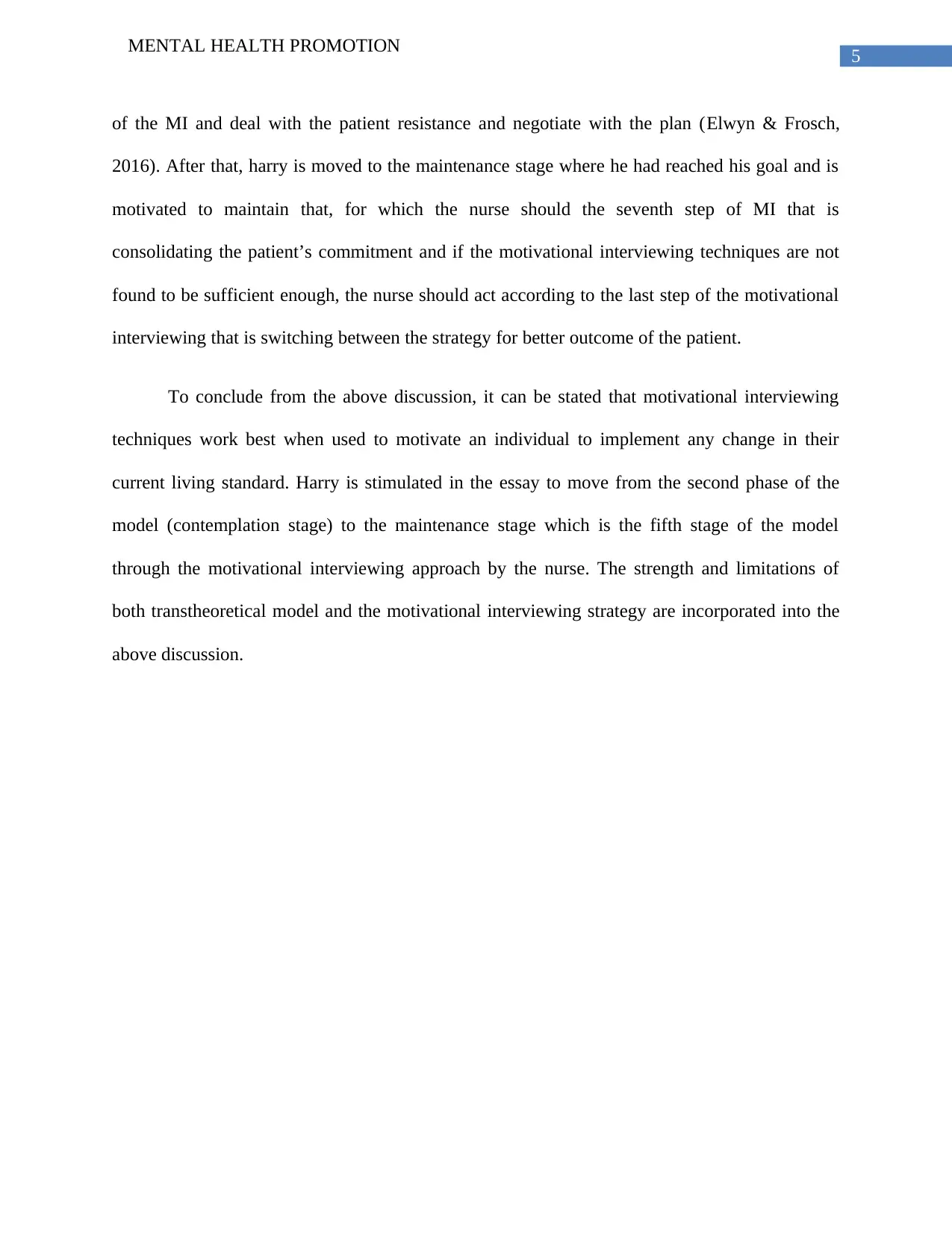
5
MENTAL HEALTH PROMOTION
of the MI and deal with the patient resistance and negotiate with the plan (Elwyn & Frosch,
2016). After that, harry is moved to the maintenance stage where he had reached his goal and is
motivated to maintain that, for which the nurse should the seventh step of MI that is
consolidating the patient’s commitment and if the motivational interviewing techniques are not
found to be sufficient enough, the nurse should act according to the last step of the motivational
interviewing that is switching between the strategy for better outcome of the patient.
To conclude from the above discussion, it can be stated that motivational interviewing
techniques work best when used to motivate an individual to implement any change in their
current living standard. Harry is stimulated in the essay to move from the second phase of the
model (contemplation stage) to the maintenance stage which is the fifth stage of the model
through the motivational interviewing approach by the nurse. The strength and limitations of
both transtheoretical model and the motivational interviewing strategy are incorporated into the
above discussion.
MENTAL HEALTH PROMOTION
of the MI and deal with the patient resistance and negotiate with the plan (Elwyn & Frosch,
2016). After that, harry is moved to the maintenance stage where he had reached his goal and is
motivated to maintain that, for which the nurse should the seventh step of MI that is
consolidating the patient’s commitment and if the motivational interviewing techniques are not
found to be sufficient enough, the nurse should act according to the last step of the motivational
interviewing that is switching between the strategy for better outcome of the patient.
To conclude from the above discussion, it can be stated that motivational interviewing
techniques work best when used to motivate an individual to implement any change in their
current living standard. Harry is stimulated in the essay to move from the second phase of the
model (contemplation stage) to the maintenance stage which is the fifth stage of the model
through the motivational interviewing approach by the nurse. The strength and limitations of
both transtheoretical model and the motivational interviewing strategy are incorporated into the
above discussion.
⊘ This is a preview!⊘
Do you want full access?
Subscribe today to unlock all pages.

Trusted by 1+ million students worldwide
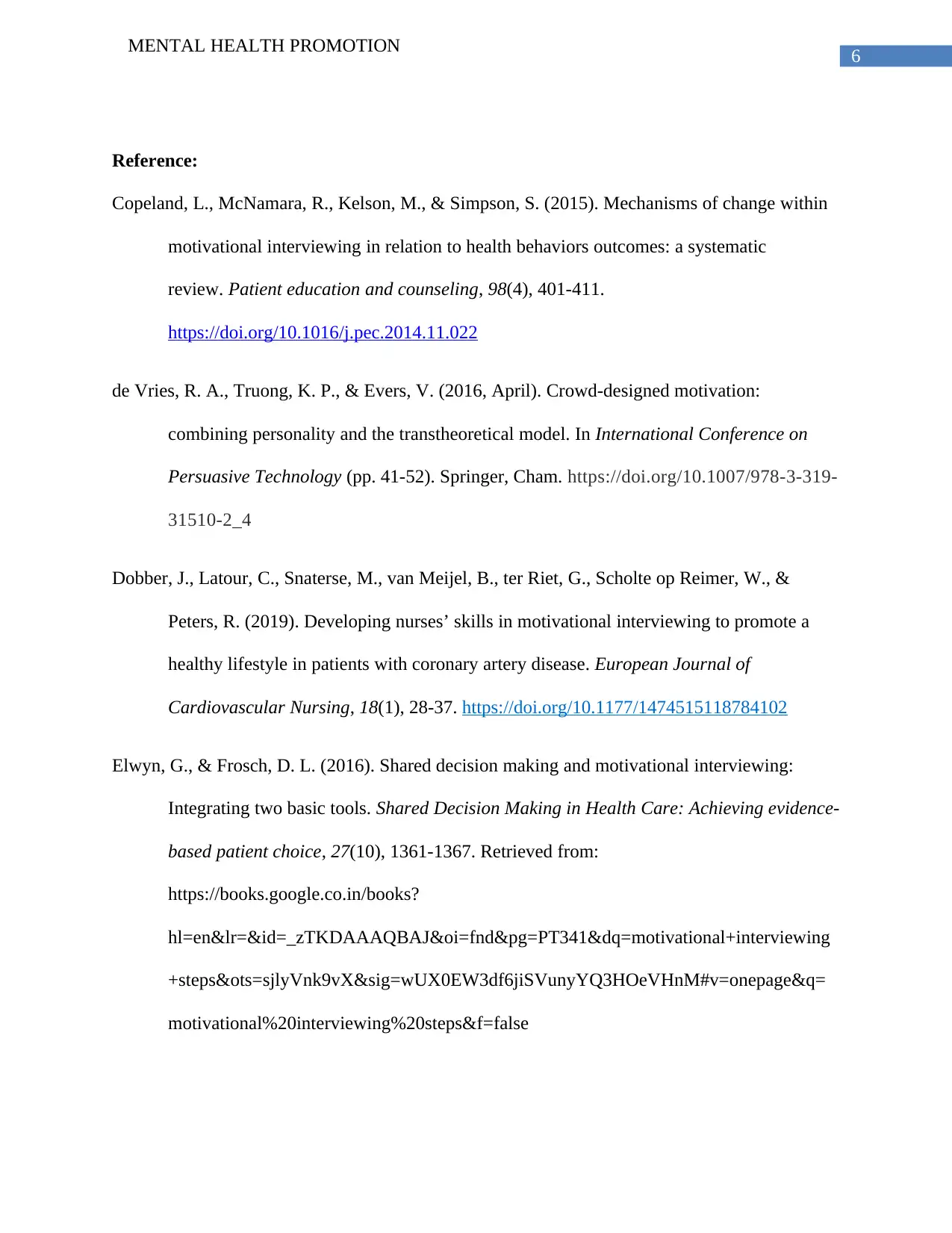
6
MENTAL HEALTH PROMOTION
Reference:
Copeland, L., McNamara, R., Kelson, M., & Simpson, S. (2015). Mechanisms of change within
motivational interviewing in relation to health behaviors outcomes: a systematic
review. Patient education and counseling, 98(4), 401-411.
https://doi.org/10.1016/j.pec.2014.11.022
de Vries, R. A., Truong, K. P., & Evers, V. (2016, April). Crowd-designed motivation:
combining personality and the transtheoretical model. In International Conference on
Persuasive Technology (pp. 41-52). Springer, Cham. https://doi.org/10.1007/978-3-319-
31510-2_4
Dobber, J., Latour, C., Snaterse, M., van Meijel, B., ter Riet, G., Scholte op Reimer, W., &
Peters, R. (2019). Developing nurses’ skills in motivational interviewing to promote a
healthy lifestyle in patients with coronary artery disease. European Journal of
Cardiovascular Nursing, 18(1), 28-37. https://doi.org/10.1177/1474515118784102
Elwyn, G., & Frosch, D. L. (2016). Shared decision making and motivational interviewing:
Integrating two basic tools. Shared Decision Making in Health Care: Achieving evidence-
based patient choice, 27(10), 1361-1367. Retrieved from:
https://books.google.co.in/books?
hl=en&lr=&id=_zTKDAAAQBAJ&oi=fnd&pg=PT341&dq=motivational+interviewing
+steps&ots=sjlyVnk9vX&sig=wUX0EW3df6jiSVunyYQ3HOeVHnM#v=onepage&q=
motivational%20interviewing%20steps&f=false
MENTAL HEALTH PROMOTION
Reference:
Copeland, L., McNamara, R., Kelson, M., & Simpson, S. (2015). Mechanisms of change within
motivational interviewing in relation to health behaviors outcomes: a systematic
review. Patient education and counseling, 98(4), 401-411.
https://doi.org/10.1016/j.pec.2014.11.022
de Vries, R. A., Truong, K. P., & Evers, V. (2016, April). Crowd-designed motivation:
combining personality and the transtheoretical model. In International Conference on
Persuasive Technology (pp. 41-52). Springer, Cham. https://doi.org/10.1007/978-3-319-
31510-2_4
Dobber, J., Latour, C., Snaterse, M., van Meijel, B., ter Riet, G., Scholte op Reimer, W., &
Peters, R. (2019). Developing nurses’ skills in motivational interviewing to promote a
healthy lifestyle in patients with coronary artery disease. European Journal of
Cardiovascular Nursing, 18(1), 28-37. https://doi.org/10.1177/1474515118784102
Elwyn, G., & Frosch, D. L. (2016). Shared decision making and motivational interviewing:
Integrating two basic tools. Shared Decision Making in Health Care: Achieving evidence-
based patient choice, 27(10), 1361-1367. Retrieved from:
https://books.google.co.in/books?
hl=en&lr=&id=_zTKDAAAQBAJ&oi=fnd&pg=PT341&dq=motivational+interviewing
+steps&ots=sjlyVnk9vX&sig=wUX0EW3df6jiSVunyYQ3HOeVHnM#v=onepage&q=
motivational%20interviewing%20steps&f=false
Paraphrase This Document
Need a fresh take? Get an instant paraphrase of this document with our AI Paraphraser
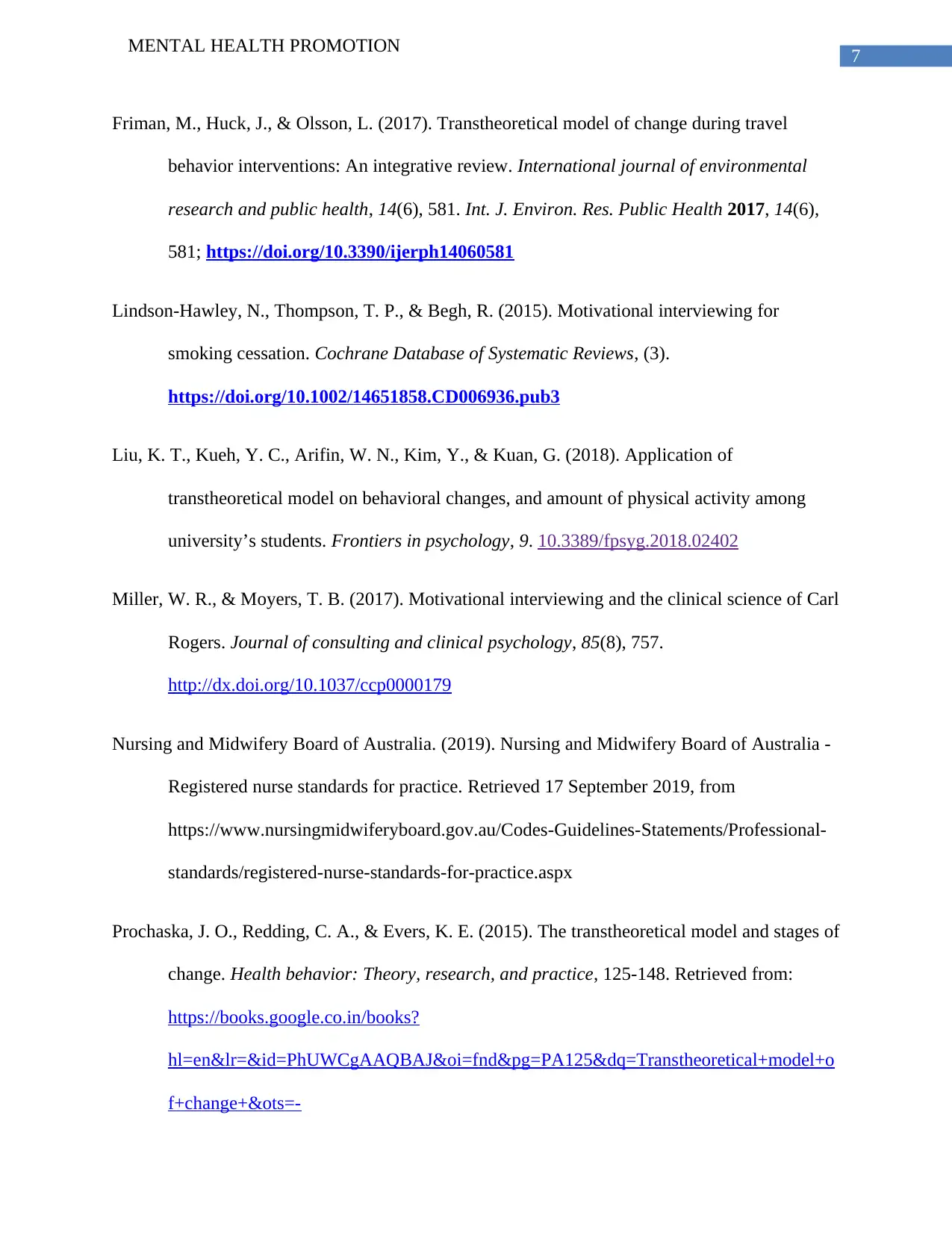
7
MENTAL HEALTH PROMOTION
Friman, M., Huck, J., & Olsson, L. (2017). Transtheoretical model of change during travel
behavior interventions: An integrative review. International journal of environmental
research and public health, 14(6), 581. Int. J. Environ. Res. Public Health 2017, 14(6),
581; https://doi.org/10.3390/ijerph14060581
Lindson‐Hawley, N., Thompson, T. P., & Begh, R. (2015). Motivational interviewing for
smoking cessation. Cochrane Database of Systematic Reviews, (3).
https://doi.org/10.1002/14651858.CD006936.pub3
Liu, K. T., Kueh, Y. C., Arifin, W. N., Kim, Y., & Kuan, G. (2018). Application of
transtheoretical model on behavioral changes, and amount of physical activity among
university’s students. Frontiers in psychology, 9. 10.3389/fpsyg.2018.02402
Miller, W. R., & Moyers, T. B. (2017). Motivational interviewing and the clinical science of Carl
Rogers. Journal of consulting and clinical psychology, 85(8), 757.
http://dx.doi.org/10.1037/ccp0000179
Nursing and Midwifery Board of Australia. (2019). Nursing and Midwifery Board of Australia -
Registered nurse standards for practice. Retrieved 17 September 2019, from
https://www.nursingmidwiferyboard.gov.au/Codes-Guidelines-Statements/Professional-
standards/registered-nurse-standards-for-practice.aspx
Prochaska, J. O., Redding, C. A., & Evers, K. E. (2015). The transtheoretical model and stages of
change. Health behavior: Theory, research, and practice, 125-148. Retrieved from:
https://books.google.co.in/books?
hl=en&lr=&id=PhUWCgAAQBAJ&oi=fnd&pg=PA125&dq=Transtheoretical+model+o
f+change+&ots=-
MENTAL HEALTH PROMOTION
Friman, M., Huck, J., & Olsson, L. (2017). Transtheoretical model of change during travel
behavior interventions: An integrative review. International journal of environmental
research and public health, 14(6), 581. Int. J. Environ. Res. Public Health 2017, 14(6),
581; https://doi.org/10.3390/ijerph14060581
Lindson‐Hawley, N., Thompson, T. P., & Begh, R. (2015). Motivational interviewing for
smoking cessation. Cochrane Database of Systematic Reviews, (3).
https://doi.org/10.1002/14651858.CD006936.pub3
Liu, K. T., Kueh, Y. C., Arifin, W. N., Kim, Y., & Kuan, G. (2018). Application of
transtheoretical model on behavioral changes, and amount of physical activity among
university’s students. Frontiers in psychology, 9. 10.3389/fpsyg.2018.02402
Miller, W. R., & Moyers, T. B. (2017). Motivational interviewing and the clinical science of Carl
Rogers. Journal of consulting and clinical psychology, 85(8), 757.
http://dx.doi.org/10.1037/ccp0000179
Nursing and Midwifery Board of Australia. (2019). Nursing and Midwifery Board of Australia -
Registered nurse standards for practice. Retrieved 17 September 2019, from
https://www.nursingmidwiferyboard.gov.au/Codes-Guidelines-Statements/Professional-
standards/registered-nurse-standards-for-practice.aspx
Prochaska, J. O., Redding, C. A., & Evers, K. E. (2015). The transtheoretical model and stages of
change. Health behavior: Theory, research, and practice, 125-148. Retrieved from:
https://books.google.co.in/books?
hl=en&lr=&id=PhUWCgAAQBAJ&oi=fnd&pg=PA125&dq=Transtheoretical+model+o
f+change+&ots=-
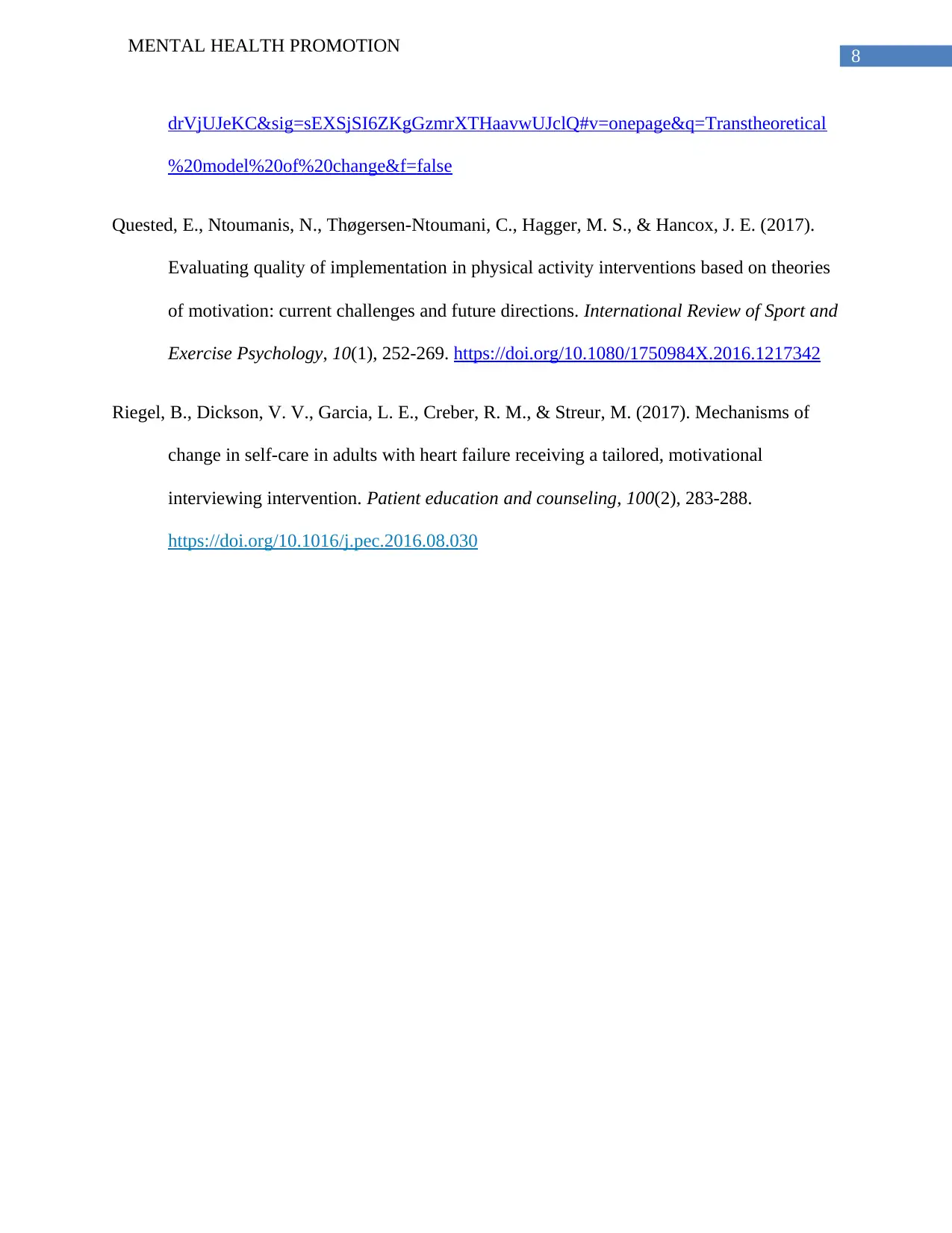
8
MENTAL HEALTH PROMOTION
drVjUJeKC&sig=sEXSjSI6ZKgGzmrXTHaavwUJclQ#v=onepage&q=Transtheoretical
%20model%20of%20change&f=false
Quested, E., Ntoumanis, N., Thøgersen-Ntoumani, C., Hagger, M. S., & Hancox, J. E. (2017).
Evaluating quality of implementation in physical activity interventions based on theories
of motivation: current challenges and future directions. International Review of Sport and
Exercise Psychology, 10(1), 252-269. https://doi.org/10.1080/1750984X.2016.1217342
Riegel, B., Dickson, V. V., Garcia, L. E., Creber, R. M., & Streur, M. (2017). Mechanisms of
change in self-care in adults with heart failure receiving a tailored, motivational
interviewing intervention. Patient education and counseling, 100(2), 283-288.
https://doi.org/10.1016/j.pec.2016.08.030
MENTAL HEALTH PROMOTION
drVjUJeKC&sig=sEXSjSI6ZKgGzmrXTHaavwUJclQ#v=onepage&q=Transtheoretical
%20model%20of%20change&f=false
Quested, E., Ntoumanis, N., Thøgersen-Ntoumani, C., Hagger, M. S., & Hancox, J. E. (2017).
Evaluating quality of implementation in physical activity interventions based on theories
of motivation: current challenges and future directions. International Review of Sport and
Exercise Psychology, 10(1), 252-269. https://doi.org/10.1080/1750984X.2016.1217342
Riegel, B., Dickson, V. V., Garcia, L. E., Creber, R. M., & Streur, M. (2017). Mechanisms of
change in self-care in adults with heart failure receiving a tailored, motivational
interviewing intervention. Patient education and counseling, 100(2), 283-288.
https://doi.org/10.1016/j.pec.2016.08.030
⊘ This is a preview!⊘
Do you want full access?
Subscribe today to unlock all pages.

Trusted by 1+ million students worldwide
1 out of 9
Related Documents
Your All-in-One AI-Powered Toolkit for Academic Success.
+13062052269
info@desklib.com
Available 24*7 on WhatsApp / Email
![[object Object]](/_next/static/media/star-bottom.7253800d.svg)
Unlock your academic potential
Copyright © 2020–2026 A2Z Services. All Rights Reserved. Developed and managed by ZUCOL.





